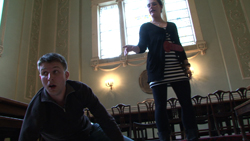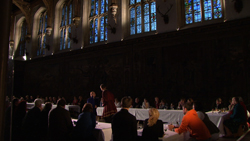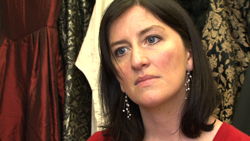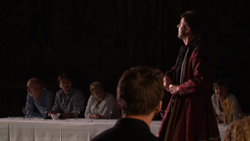John Skelton's Magnyfycence - a documentary about the play and its performance history and context
John Skelton's Magnyfycence was probably staged in 1519-20 in the court of Henry VIII: it is a satirical political farce, and a morality play which tells the story of a monarch's fall from power and wealth to poverty and despair. It is also an example of medieval drama’s flexibility, potency, and integration of what we now consider ‘avant-garde’ theatrical techniques. Director Dr Elisabeth Dutton’s 2010 staging of Magnyfycence in Henry VIII’s Hampton Court Palace pushes at the boundaries of what medieval drama can do, exploiting Skelton’s astonishing verse and the play’s theatrical virtuosity, shifting as it does from hilarious slapstick to deep pathos to communicate its powerful message.
Like Skelton’s play, this film defies simple generic classification. It combines interviews, documentary footage, and both theatrical and cinematic stagings of Magnyfycence to create a new experience of the play that addresses its performance history and context. The film uses the actors’ rehearsal process to unlock this challenging text, and supplements their discoveries and energetic performances with commentary from noted scholars and historians. These include Tom Betteridge, Professor of Early Modern English Literature and Drama at Oxford Brookes University; Kent Rawlinson, curator of the buildings at Hampton Court Palace; Greg Walker, Skelton scholar and University of Edinburgh Professor; and director Elisabeth Dutton, who is also a specialist in medieval drama and Fellow at Worcester College, Oxford.
As it reveals the narrative of Skelton’s Magnyfycence, the film explores questions surrounding Henry VIII's palace as a unique performance space, the differences between modern and medieval acting techniques, and the political and historical significance of the play. Meanwhile, it uses the dynamism of the cinematic form to make John Skelton’s one surviving dramatic work accessible to audiences of all interests and backgrounds.
Film Credits: Maria Sachiko Cecire and Mike LaRocco.













